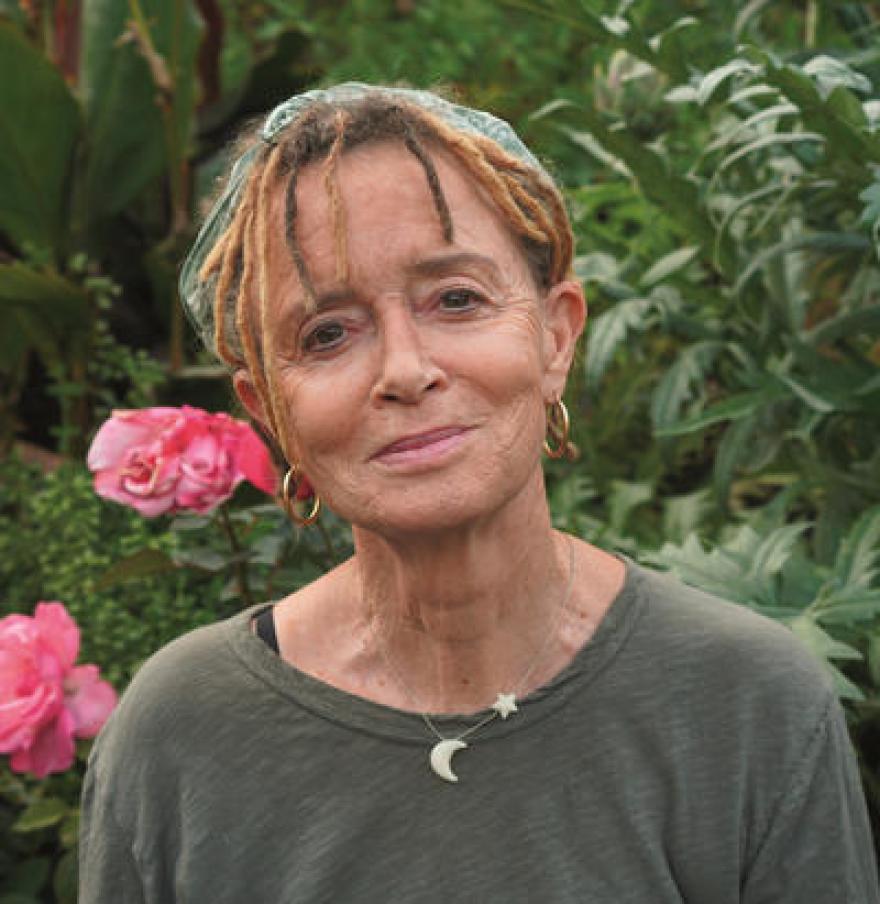
A version of this article also appeared in the It’s Not Just You newsletter. Sign up here to get a new essay from Susanna Schrobsdorff every weekend.
This year has tested my lack of faith. I was raised as an erratic agnostic, unsure about being unsure. But lately, I’m not the only one scrabbling for meaning or optimism or even someone to blame for the various messes in which we find ourselves.
And who better to address this moment than bestselling author Anne Lamott, who has both faith and a fierce sense of humor?
Lamott has written 19 books, many of them wry memoirs about spirituality, addiction, recovery, and hope, in addition to her beloved classics about motherhood and advice for writers. She has a vast following that crosses cultural boundaries, though she refers to herself as an “unabashed, extremely left-wing Christian,” and the New York Times has described her as “a feminist C.S. Lewis.”
Her newest collection of essays, Dusk Night Dawn: On Revival and Courage, is a heart-map out of the swamps of self-righteousness and pessimism. But she doesn’t shy away from the disconnectedness many of us feel in lyrical passages like this:
“Where can we hear any whispers in the cacophony, behind the drama and trauma and fever dreams of our era? With our phones to our ears, life and our minds frequently feel like casinos now. There is no sun, no pocket of quiet, there don’t seem to be exits, and the reception is terrible. Connection to anything real, to the ancient, to the mystical, to the moment, is weak, so there is bound to be existential exhaustion.”
Dusk Night Dawn has stories, parables really, from her own life and the Bible (she’s a Sunday school teacher, after all). But her best advice is simple:
Light, water, kindness, and not giving up. These are huge; all there is.
Lamott and I spoke recently over Zoom about how we deal with endless uncertainty, battling our resentment of those who don’t agree with us on crucial issues, or even small ones, and the man she calls her nice new husband—who’s also her first husband. There was much laughter, which she describes as “carbonated holiness.” And that’s an essential tenet of the gospel according to Annie.
Sign up here to get an essay from Susanna Schrobsdorff every weekend.
Below are excerpts of our conversation and we’ll share some video clips this week.
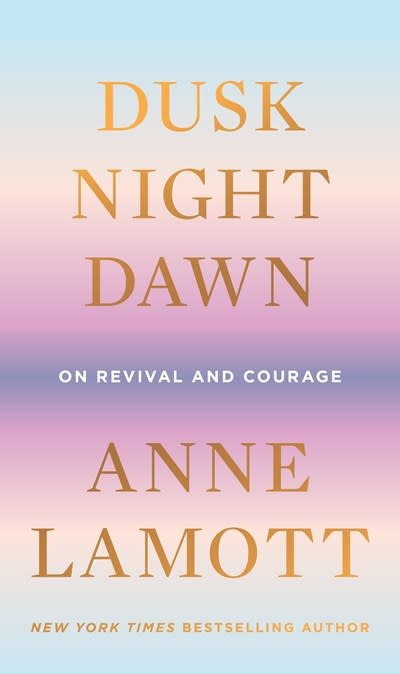
SS: How do we keep from falling into a pit of cynicism?
AL: I wanted to start my book, ‘it’s all hopeless,’ because a couple of things can be true at once. It really feels completely hopeless. And at the same time, I always turn to the serenity prayer which says, ‘grant me the serenity to accept the things I cannot change,’ which is 99.9% of things, ‘and the courage to change the things I can.’
I tell my writing students, you start where you are. You start where your feet are. And that means, ‘what can I do today?’
I find a place to land. I land in my faith. I land in my political activism. I land in my understanding that the people about 15 minutes from where I live are having extreme food deficits. So what I will probably do is to go to Safeway and fill up a couple of bags of canned food and dried food and, of course, Oreos.
And I practice radical self-care. I’m making myself a really delicious breakfast, I’ve boiled some eggs, and I’m gonna have egg salad with lots of mayonnaise. I think fat is delicious, fats are one of the communion elements. And I’ll see how I can be of service today.
SS: There’s a lot of anger in the U.S. right now. Does it get to you?
AL: There’s a chapter in the book based on what Martin Luther King said, which was, ‘don’t let them get you to hate them.’ Once you let them get you to hate them, you’re doomed, you’ve lost your center, you’ve lost all that is wonderful and true and sweet and dear and probably messy about your life.
Probably my biggest character defect is judgment: ‘This is good. This is bad. They’re the problem, they’re the reason.’ There’s awareness of my own hostility, my own inner Donald Trump, who’s bombastic and ignorant in so many ways. I get to unfortunately look at my own crazy uncooked parts.
SS: And then what?
AL: And then you ask, what’s the action I can do today?
Do loving things. You want to change your whole day? Just for the next few hours, if you’re in traffic, let other people go first. Stop what you were about to do, and let other people go first.
The restoration, both of our own selves and our community, it’s grassroots, it’s small things, it’s like Mother Teresa said: ‘No one can do great things, but each of us can do small things with great love.’
SS: I loved what you wrote about the ‘third third of life,’ and how it has changed your perspective.
AL: I’m 67. There are a lot of things I really don’t love. I don’t love the upper arms. I’m a really religious woman, and I’m obsessed with the fact that my upper arms just look like hell.
But what I do love about being older are the blessings of myopia—I can’t see as much of what’s wrong with everybody else as I used to be able to.
By the time you’re about 50, people that you really can’t live without have died, and you start to take your mortality seriously. You start to realize you do have one short, precious life. How are you going to live it?
SS: Do you still have feelings of unworthiness even with all the bounty in your life?
AL: I will always have episodes of low self-esteem and self-loathing and not-enoughedness and self-recriminations. But the thing about the third third is that [those episodes] last so much shorter. They might last for a few hours instead of my entire 20s. Or there’s a week where I just feel really down on myself, or that I don’t know what I was thinking when I married Neal [Allen]. It was three days before I got Medicare and Social Security, I was old. I met him five years ago yesterday, and we really haven’t been apart at all. And yet, people are really annoying, and people are damaged, and we rub up against each other’s damage.
So there are days I’m so grateful. Neal is really a lovely and brilliant, gentle soul, and he’s a spiritual seeker also, although very ecumenical. And then there are days like last night [when] he made bacon sandwiches, and I listened to him eating bacon, and I just felt, I can’t go on. I felt like it’s so unfair that Protestants can’t get annulments, and I’ll convert.
But when Neal is doing one of his know-it-all things, and I want to correct him, I’m the crazy person. If you’ve got a problem, you gotta go look in the mirror. Same with what we were talking about earlier, the anger. It’s not them. They are not my problem.
SS: My fantasy is to escape to another place or country where I’ll definitely be nicer.
AL: If it’s out there, it’s not gonna work. If it’s another country, if it’s a perfect spouse, if it’s a perfect diet, if it’s out there, it’s gonna work only for part of a day.
It’s not out there. No, it’s an inside job…. Horribly, horribly. It’s an inside job.
SS: Can you talk a bit about why your friendships are so important?
AL: The reason I have so much religious faith is because of the quality of my friendships. You have three or four people that you let into the very center, your heart cave, who know the very center of you and did not run screaming for their cute little lives. And because of the quality of my best friendships, I have faith that life tilts towards the good and that no matter what happens, I’ll come through.
SS: You’re a Sunday school teacher; what are your kids asking about these days?
AL: Mostly, what they want to know is what you want to know and what I want to know. Something scary has happened. What do we do in the face of that?
You know what we do, Susanna? We do what we can. And we do it one day at a time.
Write to me at: Susanna.notjustyou@gmail.com, or via Instagram: @SusannaSchrobs. And, sign up here to get an essay every weekend.

GALLERY 📷
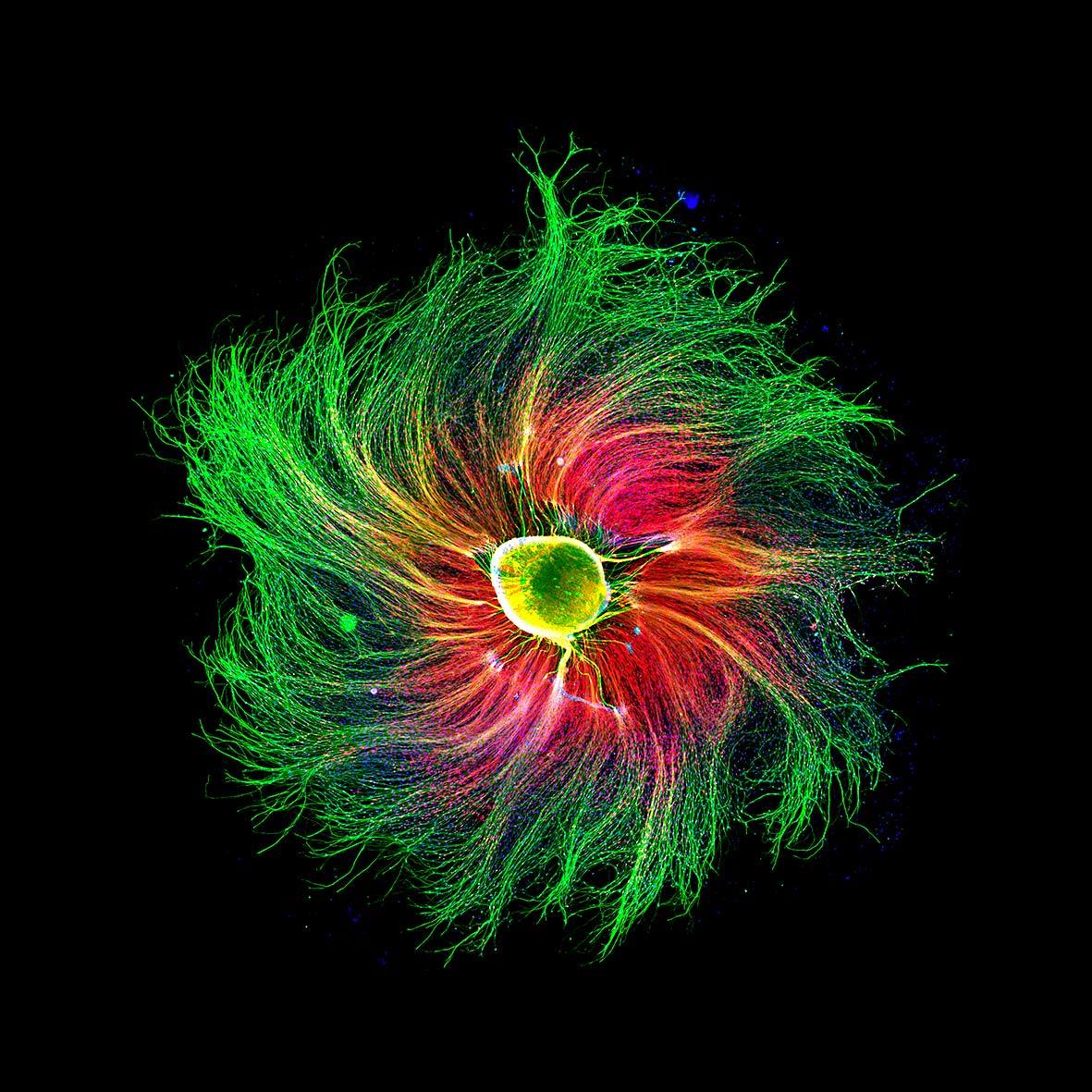
This week, I’m sharing the work of some pros from the 47th annual Nikon Small World Photomicrography Competition which announced its 2021 winners recognizing the art and science of capturing images through a microscope. I loved this image above of an embryonic rat’s sensory neuron by Paula Diaz of Santiago, Chile. Also, check out the winners of the Nikon Small World In Motion video competition.
THE ROUND-UP 🌟
🎵 TIME revealed their list of the 100 Most Influential People of 2021 this week and I loved what Miley Cyrus wrote about Dolly Parton: “At her core, she is the definition of a humanitarian. She’s also the world’s most impeccably purposeful walking contradiction, having developed her iconic look after being inspired by the town tramp. Now she’s known as a saintly, even godlike, figure.”
📚 “She taught me that cobwebs are hammocks for spirits, a stop along the way to rest their weary skins, a knot on the thread of their pilgrimage to a place they had almost touched once.” From “A Retrograde” by Desiree C. Bailey whose book “What Noise Against the Cane” is on the just-released longlist for the 2021 national book awards for poetry.
🔥 The New Science on How We Burn Calories: Turns out, energy expenditure holds steady from age 20 through the next 40 years. Even during pregnancy and menopause; you burn calories as efficiently at 55 as you do at 25. At around age 60, energy expenditure begins to drop again and continues to do so.
🤳🏽 On Teen Girls and Instagram: A disturbing new report in the Wall Street Journal revealed internal Facebook research showing that the company knows how toxic their Instagram platform is for girls and young women: “Teens blame Instagram for increases in the rate of anxiety and depression,” said another [Facebook report]. “This reaction was unprompted and consistent across all groups.” And: “Among teens who reported suicidal thoughts, 13% of British users and 6% of American users traced the desire to kill themselves to Instagram, one [Facebook] presentation showed.
“If you wanted to create an environment to churn out really angsty people, we’ve done it,” says Janis Whitlock, director of the Cornell Research Program on Self-Injury and Recovery who spoke to me for a cover story I wrote in 2016 at the start of this tidal wave of teen anxiety, depression, and struggles with social media. She added: “It’s that they’re in a cauldron of stimulus they can’t get away from, or don’t want to get away from, or don’t know how to get away from.” Read the full story and find resources for families here.
If someone forwarded this edition of the newsletter, consider subscribing here.
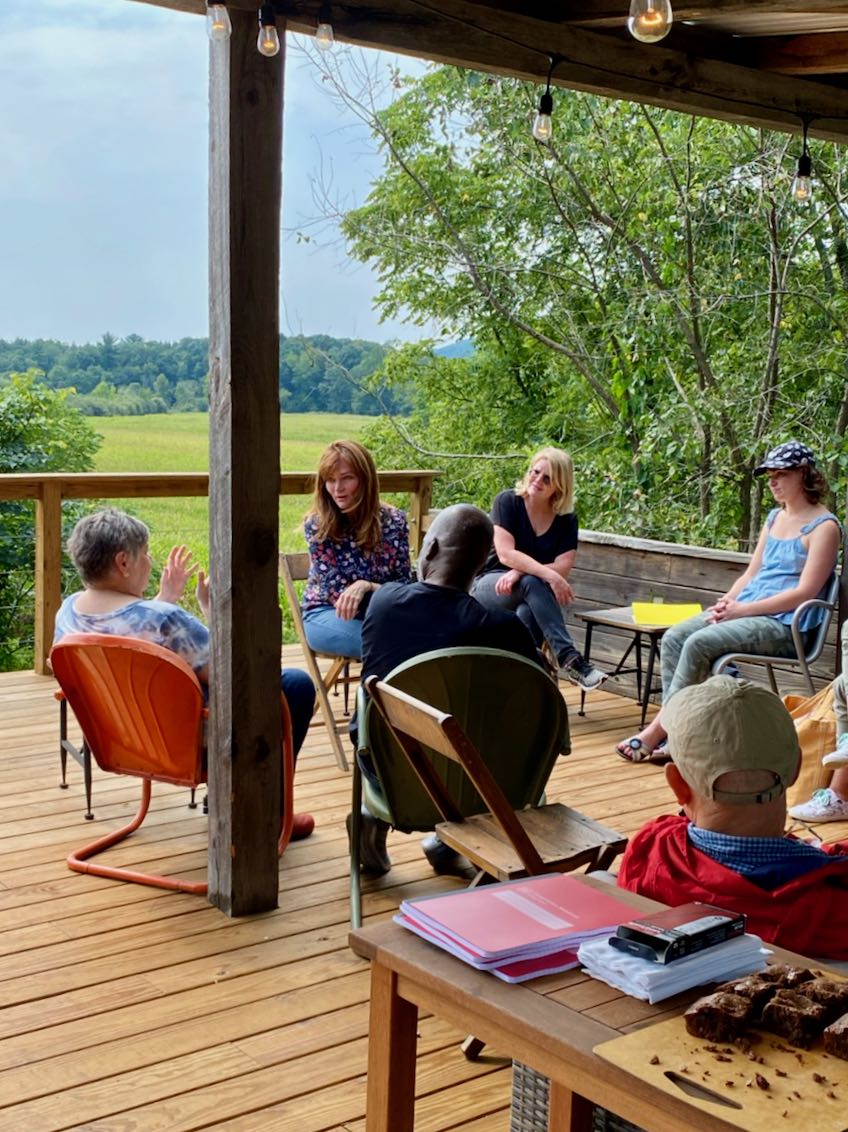
Herewith a few snaps from the creative writing workshops we held at Taconic Ridge Farm in upstate New York on September 11 and 12 with the phenomenal New York Times bestselling novelist Libba Bray The sessions were so nourishing, and the participants even included some intrepid “It’s Not Just You” subscribers.
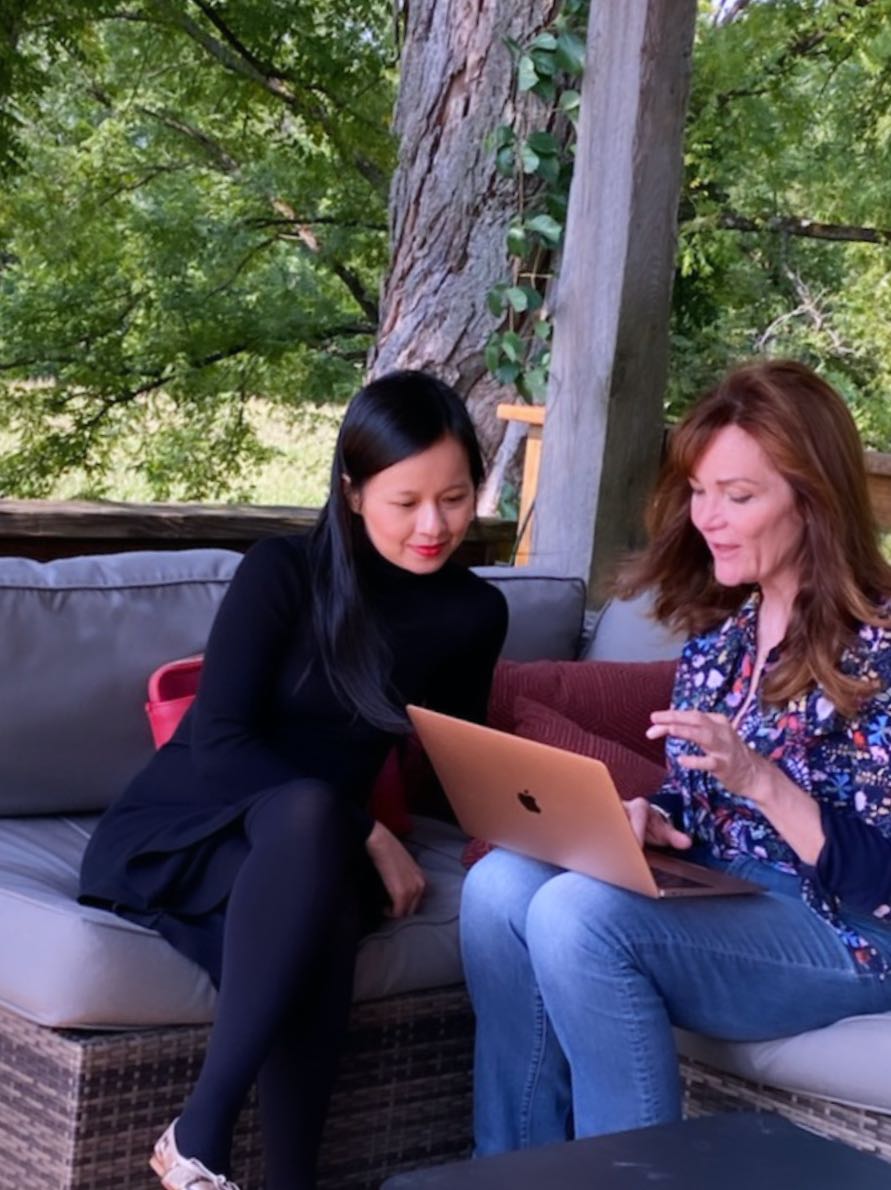
EVIDENCE OF HUMAN KINDNESS ❤️
Here’s a reminder that creating a community of generosity elevates us all.
Khalil is a 22-year old Syrian refugee whose family arrived in Canada a few years ago seeking safety from the ongoing conflict. Last year, during the height of the pandemic lockdown, Khalil decided to share a secret he has been guarding from his devotedly religious parents for as long as he can remember: he is gay.
His parents took the news with disappointment and sadness because his truth isn’t congruent with their own. Living at home with his parents, who are still struggling with the admission but are working through it, had become uncomfortable and increasingly difficult. So when Khalil finally had the opportunity to move out and into student housing, he took it – even though it would be really tough financially to make it work.
Khalil reached out to Pandemic of Love after hearing about the organization on Dear Chelsea, comedian Chelsea Handler’s podcast. Handler referenced POL when giving advice to a young man from New York City who struggled to pay his rent due to loss of income during the lockdown. Khalil thought, “what have I got to lose?” and filled out an application for help.
Within 72 hours, Khalil’s needs for help with rent were met, but beyond the financial assistance was the affirmation that he matters and that he is perfect just the way he is. He wrote this to Pandemic of Love:
“You’ve made this period of my life so much better. I literally had $2 in my bank account last week and was feeling so anxious and depressed. What you did for me was more than just financial, you made me realize I am not alone and that others do care about people like me.”
Story courtesy of Shelly Tygielski, author of “Sit Down to Rise Up” and founder of Pandemic of Love, a grassroots organization that matches volunteers, donors, and those in need.
Write to me at: Susanna.notjustyou@gmail.com, or via Instagram: @SusannaSchrobs. And, sign up here to get an essay every weekend.
More Must-Reads from TIME
- Cybersecurity Experts Are Sounding the Alarm on DOGE
- Meet the 2025 Women of the Year
- The Harsh Truth About Disability Inclusion
- Why Do More Young Adults Have Cancer?
- Colman Domingo Leads With Radical Love
- How to Get Better at Doing Things Alone
- Michelle Zauner Stares Down the Darkness
Contact us at letters@time.com